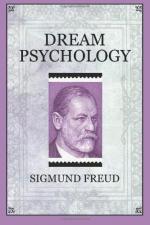This function of dreams becomes especially well marked when there arises some incentive for the sense perception. That the senses aroused during sleep influence the dream is well known, and can be experimentally verified; it is one of the certain but much overestimated results of the medical investigation of dreams. Hitherto there has been an insoluble riddle connected with this discovery. The stimulus to the sense by which the investigator affects the sleeper is not properly recognized in the dream, but is intermingled with a number of indefinite interpretations, whose determination appears left to psychical free-will. There is, of course, no such psychical free-will. To an external sense-stimulus the sleeper can react in many ways. Either he awakens or he succeeds in sleeping on. In the latter case he can make use of the dream to dismiss the external stimulus, and this, again, in more ways than one. For instance, he can stay the stimulus by dreaming of a scene which is absolutely intolerable to him. This was the means used by one who was troubled by a painful perineal abscess. He dreamt that he was on horseback, and made use of the poultice, which was intended to alleviate his pain, as a saddle, and thus got away from the cause of the trouble. Or, as is more frequently the case, the external stimulus undergoes a new rendering, which leads him to connect it with a repressed desire seeking its realization, and robs him of its reality, and is treated as if it were a part of the psychical matter. Thus, some one dreamt that he had written a comedy which embodied a definite motif; it was being performed; the first act was over amid enthusiastic applause; there was great clapping. At this moment the dreamer must have succeeded in prolonging his sleep despite the disturbance, for when he woke he no longer heard the noise; he concluded rightly that some one must have been beating a carpet or bed. The dreams which come with a loud noise just before waking have all attempted to cover the stimulus to waking by some other explanation, and thus to prolong the sleep for a little while.
Whosoever has firmly accepted this censorship as the chief motive for the distortion of dreams will not be surprised to learn as the result of dream interpretation that most of the dreams of adults are traced by analysis to erotic desires. This assertion is not drawn from dreams obviously of a sexual nature, which are known to all dreamers from their own experience, and are the only ones usually described as “sexual dreams.” These dreams are ever sufficiently mysterious by reason of the choice of persons who are made the objects of sex, the removal of all the barriers which cry halt to the dreamer’s sexual needs in his waking state, the many strange reminders as to details of what are called perversions. But analysis discovers that, in many other dreams in whose manifest content nothing erotic can be found, the work of interpretation shows them up as, in reality, realization of sexual desires; whilst, on the other hand, that much of the thought-making when awake, the thoughts saved us as surplus from the day only, reaches presentation in dreams with the help of repressed erotic desires.




